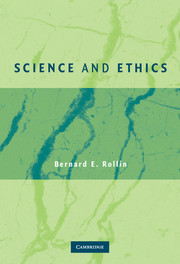Book contents
- Frontmatter
- Contents
- Acknowledgments
- Preface
- 1 The Waxing and Waning of Faith in Science
- 2 Scientific Ideology and “Value Free” Science
- 3 What Is Ethics?
- 4 Ethics and Research on Human Beings
- 5 Animal Research
- 6 Biotechnology and Ethics I: Is Genetic Engineering Intrinsically Wrong?
- 7 Biotechnology and Ethics II: Rampaging Monsters and Suffering Animals
- 8 Biotechnology and Ethics III: Cloning, Xenotransplantation, and Stem Cells
- 9 Pain and Ethics
- 10 Ethics in Science
- Bibliography
- Index
2 - Scientific Ideology and “Value Free” Science
Published online by Cambridge University Press: 15 December 2009
- Frontmatter
- Contents
- Acknowledgments
- Preface
- 1 The Waxing and Waning of Faith in Science
- 2 Scientific Ideology and “Value Free” Science
- 3 What Is Ethics?
- 4 Ethics and Research on Human Beings
- 5 Animal Research
- 6 Biotechnology and Ethics I: Is Genetic Engineering Intrinsically Wrong?
- 7 Biotechnology and Ethics II: Rampaging Monsters and Suffering Animals
- 8 Biotechnology and Ethics III: Cloning, Xenotransplantation, and Stem Cells
- 9 Pain and Ethics
- 10 Ethics in Science
- Bibliography
- Index
Summary
Before exploring specific ethical issues that the scientific community has mishandled or failed to handle, we must first address a basic question: Why does the research community have such a bad track record in dealing with ethics? Why has it consistently missed the mark set by society for rational ethical discussion and explanation? And what should it be doing instead? In my view, the problem grows out of strongly and unquestioningly held beliefs in the scientific community about science and ethics, beliefs that are never questioned to the extent that they constitute a hardened and unshakeable ideology that I have called “scientific common sense” or “scientific ideology,” which stands in the same relationship to scientists' thinking that ordinary common sense does to the thinking of nonscientists. It is to this ideology we now turn.
What is an ideology? In simple terms, an ideology is a set of fundamental beliefs, commitments, value judgments, and principles that determine the way someone embracing those beliefs looks at the world, understands the world, and is directed to behave toward others in the world. When we refer to a set of beliefs as an ideology, we usually mean that, for the person or group entertaining those beliefs, nothing counts as a good reason for revising those beliefs, and, correlatively, raising questions critical of those beliefs is excluded dogmatically by the belief system. (As David Braybrooke has stated it, “ideologies distort as much by omitting to question as by affirming answers.”)
- Type
- Chapter
- Information
- Science and Ethics , pp. 11 - 30Publisher: Cambridge University PressPrint publication year: 2006



